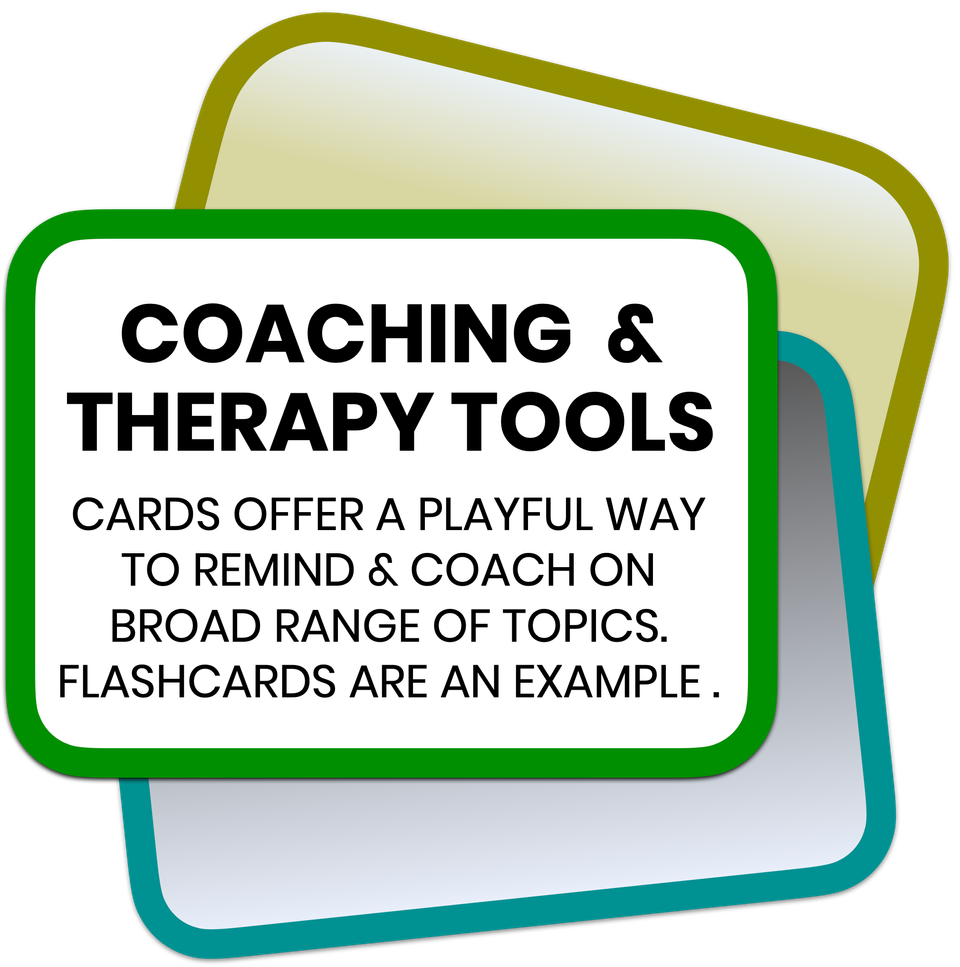Coaching & Therapy Tools in Your Pocket as Digital Decks
Boost personal growth with digital decks featuring CBT, DBT, & ACT like tools. Accessible on your phone, these decks offer daily exercises, emotional regulation, and mindfulness practices, providing structured, affordable, & actionable support for mental wellness.

Why and how can Coaching Cards & Therapy Tools like CBT, DBT & ACT help with your personal growth when delivered as Digital Decks in your pocket.
Coaching cards and therapy tools like CBT (Cognitive Behavioral Therapy), DBT (Dialectical Behavior Therapy), and ACT (Acceptance and Commitment Therapy), delivered as digital decks, can significantly support personal growth. Here’s how and why:
1. Immediate Access for On-the-Go Support
- How: Digital therapy decks are accessible via mobile devices, meaning users can engage with CBT, DBT, and ACT tools anytime they need support—whether at home, work, or while commuting.
- Why: Personal growth often requires immediate intervention when facing emotional or mental challenges. Having these tools in your pocket allows for timely coping strategies that help manage stress, anxiety, or other issues as they arise.
2. Structured, Actionable Guidance
- How: Therapy tools provided through digital decks break down techniques into simple, digestible steps. For example, CBT exercises like reframing negative thoughts, DBT’s emotional regulation practices, or ACT’s mindfulness and acceptance exercises are all delivered in manageable card-sized prompts.
- Why: Complex therapeutic concepts can be overwhelming, but when delivered as bite-sized, actionable cards, they become easier to integrate into daily life. This structured approach helps people consistently practice personal growth.
3. Tailored Exercises and Self-Reflection
- How: Digital decks can offer personalized exercises based on specific areas of personal growth, such as anxiety management, emotional regulation, or improving mindfulness. Users can choose cards tailored to their immediate needs and reflect on the insights they offer.
- Why: Personalized, targeted exercises ensure that you’re working on the issues most relevant to your growth, helping you focus and get meaningful results. Consistent reflection is essential for creating self-awareness and lasting change.
4. Daily Practice and Habit Building
- How: Digital decks allow for daily or regular practice of therapeutic techniques, encouraging users to pull cards daily to work through exercises. This builds habits around practices like thought restructuring (CBT), mindfulness (ACT), or distress tolerance (DBT).
- Why: Therapy-driven personal growth requires consistent effort. Regular, bite-sized practices provided by digital decks help users stay engaged and build long-term habits around emotional health and resilience.
5. Emotional Regulation and Mindfulness Tools
- How: DBT and ACT techniques focus on emotional regulation and mindfulness, offering tools to stay present and manage overwhelming emotions. Digital cards provide practical exercises like deep breathing, progressive relaxation, or mindfulness prompts that can be accessed whenever needed.
- Why: When experiencing emotional distress, it can be difficult to apply coping strategies without guidance. Digital decks offer quick and accessible reminders to use proven techniques, helping to reduce emotional overwhelm and promote calm.
6. Cognitive Restructuring and Reframing
- How: CBT cards often focus on identifying negative thought patterns and replacing them with more realistic, positive alternatives. Digital decks make it easy to pull cards that offer reframing exercises, helping users challenge unhelpful thoughts and build healthier mental habits.
- Why: Repeated cognitive restructuring is crucial for personal growth, especially for those struggling with anxiety, depression, or low self-esteem. Digital tools provide consistent reinforcement, making the process easier and more frequent.
7. Accountability and Progress Tracking
- How: Many digital decks allow users to track their progress over time. This might include journaling prompts, reflection questions, or check-ins that help users observe their growth and stay accountable to their personal development goals.
- Why: Personal growth is more sustainable when it’s measurable. By tracking progress, users can reflect on their journey, reinforcing the value of the work they’re doing and staying motivated to continue.
8. Cost-Effective Therapy Support
- How: Digital therapy decks are often much more affordable than traditional therapy or coaching sessions. They provide consistent support without the high cost or time commitment, making mental health tools more accessible to a wider audience.
- Why: Affordability is a key factor in making therapy tools available to more people. Digital decks offer an accessible way to experience the benefits of proven therapeutic techniques like CBT, DBT, and ACT without financial barriers.
In summary, coaching cards and therapy tools like CBT, DBT, and ACT, when delivered as digital decks, offer immediate, structured, and affordable guidance for personal growth. They promote consistency, mindfulness, emotional regulation, and self-reflection, making it easier for users to overcome mental health challenges and build long-term, healthy habits.